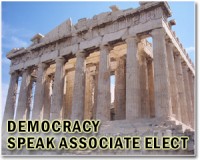| . |  |
. |
New Delhi (AFP) March 18, 2011 He's little known outside his tiny community but is expected to replace a global icon: 43-year-old Lobsang Sangay faces a daunting task if he wins Sunday's vote for a new Tibetan leader. Sangay, who has never visited his homeland, is the front-runner to become the next prime minister of the Tibetan government-in-exile at a time of transition and tumult for the movement headed by the Dalai Lama. The world's most famous monk, a global figurehead for the struggle against Chinese rule in Tibet, has announced he intends to retire as political chief and transfer his powers to a new democratically elected leader. The success or failure of the move will have grave consequences for the Tibetans' struggle for greater self-determination, a burning geopolitical issue that continues to bedevil relations between China and the West. "His Holiness is 400-plus years of institution," Sangay told AFP in Dharamshala, a town in the foothills of the Indian Himalayas where the Tibetan exile community has been based for more than 50 years. "No one can replace or substitute him. The major challenge for anyone is to build up a reputation and credibility," he says. The Harvard scholar, born in a Tibetan settlement in the tea-growing region of Darjeeling in northeast India, insists however that there is hunger in the community to "see the younger generation taking over the leadership." On Sunday, this will be tested when an estimated 85,000 Tibetans in exile in 13 countries select a new leader from a trio of candidates who are all secular, non-religious figures for the first time. Sangay faces competition from two older men, Tenzin Tethong and Tashi Wangdi, who both have a track record in government in the Tibetan administration in exile in Dharamshala -- unlike him. The Dalai Lama's idea to devolve power reflects concern about how to sustain a struggle for Tibetan rights that the Nobel laureate has single-handedly carried since fleeing his homeland to India in 1959. The worry is that when the 75-year-old Dalai Lama dies the Tibetan cause, stripped of its totemic leader, will fade into obscurity. An elected figure is seen as a solution. But this route is fraught with difficulties. The government-in-exile is not recognised by any foreign governments; China refuses to acknowledge it; and its legitimacy in the eyes of Tibetans in Tibet might be questioned without the Dalai Lama's patronage. "It is hard to imagine a lay person running an exile government that has been outside for 50 years having a commanding role in discussions in the future in terms of dealing with China," said Robert Barnett, a Tibet expert from Columbia University in New York. He believes, however, that several factors could help a new leader to establish himself, notably if the election galvanises support inside Tibet for democracy or if China decided it preferred to deal with a non-religious figure. Samdhong Rinpoche, the current prime minister, says the Dalai Lama is thinking long-term and forcing exiled Tibetans to face a future without him when a leadership void will have to be filled. He admits the proposed transfer of power has led to a feeling of "helplessness" in the 43-member parliament which is required to ratify the change, where some members broke down in tears during debates on the issue. "His Holiness is looking 100 years ahead. We are trying to think 20 years ahead and most of the assembly members they only think a few years ahead," he told AFP in an interview this week. Sangay says that there is obvious anxiety among voters about what will happen next. In terms of policy, there is unlikely to be a major switch during the Dalai Lama's lifetime, particularly on his central "Middle Way" approach with China that favours meaningful autonomy for Tibet and not independence. The Dalai Lama, both a god and king figure for Tibetans, will remain overall spiritual leader and will retain overwhelming influence during his lifetime. "I regard him as our leader now and in the future. All the major decisions that need to be taken, I would like to consult with him and His Holiness would surely advise on these matters," Sangay said. "Anyone that gets elected has to implement the 'Middle Way' policy passed by parliament and the Dalai Lama. I will do so," he added.
Share This Article With Planet Earth
Related Links Democracy in the 21st century at TerraDaily.com
 Ex-first lady Manigat aims to lead quake-hit Haiti
Ex-first lady Manigat aims to lead quake-hit HaitiPort-Au-Prince (AFP) March 17, 2011 Soft-spoken former first lady Mirlande Manigat was an occupant of Haiti's presidential palace for just a few brief months before her husband Leslie was ousted in a 1988 coup. She could return as the quake-hit Caribbean nation's first elected female leader if she wins an election run-off on Sunday - but the palace has been in ruins since a massive earthquake more than a year ago. "Haitia ... read more |
|
| The content herein, unless otherwise known to be public domain, are Copyright 1995-2010 - SpaceDaily. AFP and UPI Wire Stories are copyright Agence France-Presse and United Press International. ESA Portal Reports are copyright European Space Agency. All NASA sourced material is public domain. Additional copyrights may apply in whole or part to other bona fide parties. Advertising does not imply endorsement,agreement or approval of any opinions, statements or information provided by SpaceDaily on any Web page published or hosted by SpaceDaily. Privacy Statement |